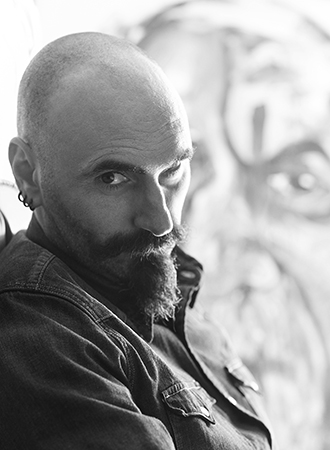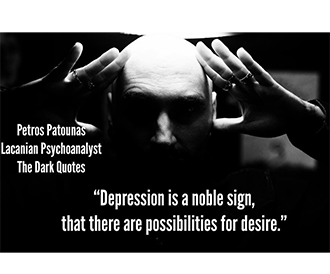Father, forgive them- for they are idiots: and they divided up their desire by casting the utterance’s lot upon signifiers to whom they could only venerate and subtracted from their Ousia the Act of life: they, at a standstill, and speaking of positions and never of Kinesis, think that corpses without desire are more athletic to be esteemed than manure.
And, from Desire and its evocative phonation – to which, to which, he who has never been valorous and a subject of commissioning his full speech with the cornucopia of the Act, that it could have been characterised by the ethic as a veridical Act besides that of the ceremonious suicide: a much more delicate one, indeed, is the act of life through which, the subject, proceeds to the ErgOn- it is the only factual creation, po-e-n-try, unless one amuses oneself by insinuating honours to mimicry and to a language whose letters are those signifiers, master has to be said, who attach libido to the flesh, and, yet, they are not those Letters of Lunguage through which, desire, through which desire becomes destiny- for the Breath is the Object of Desire and the motion by which the Das Ding functions as a DesDine for those subjects who know what to do with the Real: with this, let us mark on the wounds of a hand in need of fingers to touch the trauma, as a gesture necessary for those to whom devotion has no biosphere in their vertical history, and have emanated science as the Other of our practise, that those Letters are not read but breathed from where the gap of one’s desire choked: a subject is truly divided by its desire that returns and returns and knocks the doors of the deaf man- for he who has spoke for βίος, the signifier of life that brings forth death, has also said that “The most beautiful universe is pouring out sweepings at random:” let us call this descry and crossing of the path with the letters of Lunguage as the Πνοή του Λόγου∙ and, with this, once again and hopefully for the last time, time, time as the false guarantee of he who does not have faith in the process and Kinesis, of life itself, we will renounce the line of the thieves and the scribes torturing the supposed ethic of deontology, that other aspect of the Other of a rhetoric we have been too bored to death to hear, for a thousand times, which they repeat, for, they do not assume responsibility and cloud themselves behind the Subject supposed to know when in fact our experience in the clinic tells us that we should know about our acts and especially to assume the accountability of our interventions: deontology is the displacement of one’s’ desire onto the context of a supposed orientation, one certainly missing the Ουσία of what constitutes the ex- in-stance of psychoanalysis: for, it is within its schematic kinesis where letters write what becomes, from desire, a destiny not anchored to the Other∙ the Ουσία is that subsisting in the inconsequence of that which orders a body within the cosmos- subsisting by and in itself and by not having its being in AnOther- as long as it is familiar with its Lunguage- because desire for desire, to which bad and lazy mathematicians forget to mention that the square root of such a division, desire for desire: the square root of desire for desire is the Act.
And when the die was cast, they were at a halt and afraid to speak up their mind because Jouissance displaces desire and de-condenses the letters’ schemata: they actually had faith as long as it is not theirs- how much does the signifier love the thieve of the cross, him for whom neither life nor death have been enabled to have some faith to that which is of the world and of the Unheimliche∙ one ought to love moments of crisis: it is what capacitates the Act and the chains of acts functioning perpendicular on the linearity of the signifiers- that which life teaches us that it is not science but conscience of the Real time, no less than faith: it could have been a good idea for ones’ formation, not by the way of the symptom(a), which contains the later corpse, but neither of the syn-drome, a signifier including the Greek Δρόμος not suitable for psychoanalysts who cannot be athletic, but via that Act which forces a Freudian body to breathe, and to which it ought to Συνδράμει: it cannot do otherwise unless we bring to the fore the practise’s monolith of fixation as something outside of this world, to turn it into an intellectual uncanny for simpletons who foreclose life itself: for, the longing of desire that returned from the repressed to find its letters is celebrated with the psychoanalysts’ prayer: that which is of the psychoanalyst, because, if desire is what has brought the Hypokeimenon of the unconscious into being, then, then the Act is what shall give rise to its Kinesis∙ the ErgOn is the speaking being who has spoken and acts: the subject is faced with the peaceful ecstasy of the idiot, he who speaks to the subject with the voice of a priest, with an inhuman calmness of a supposed holy man- a supposed veil to the idiot, him who has no experience of life but knows how to speak and write about master signifiers: that Voice is a semblance and the psychosomatic stimulation of the psychoanalysts cave’s idols.
And the numbers of the rolling cubes have revealed a code- not enough for the Same to ruin the fame of the Other: the divided subject speaks of the longing of Enosis with desire- it is here that analysts dedicate their body to the Act of Desire and pass the threshold of episteme towards Doxa, not doxology but Feme- feminine indeed: and, my dear friend, in line with Freud as you said, that a necessary university discourse becomes the base of analysts, assuming that it is from the gap and faults of knowledge’s guarantee that the unconscious manifests its ways, as a parapraxis, paralogia, a slip of what the posture of he who thinks he knows, necessary that might be in the same way catholic priests are trained and in themselves they forgot how is it to have some faith to that god who is situated in the unconscious, and to that desire who is repressed∙ if there is a knowledge in the unconscious, it is that of a mystery of the Real, of how to allow it come to you, of that infamous knowing what to do… and without a Father- it cannot be imaginary, as the word becomes flesh and through the act, an act of faith, the flesh becomes word: that ought to be one of the end of analysis, but for the very few who are not trapped within the signification of the phallus as the priest’s training towards meaning, and accept a direct blow to their countenance by the object, until they dissolve it into thin air, one of a kind for this specific Breath, which is the only object of desire to attain, each in its own rhythm and quantity∙ for, you went into the trouble to explain in another seminar that the Doxa you referred to, so many times, has not been that of the coward and of the Pharisee: and from the Jew who knows how to read, you pointed in your ignorance to the Gentile who knows how to write.
And when the subject, beyond the Other and close to the Alien, in Enosis with desire, it is divided by another lack- his Act: none has given them the universe- a feminine without an Ethic.


Pingback: News – May 2015 | LACANONLINE.COM